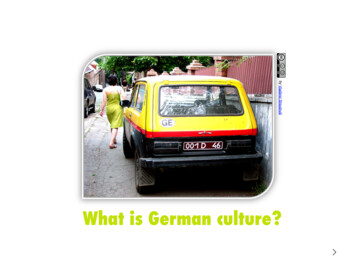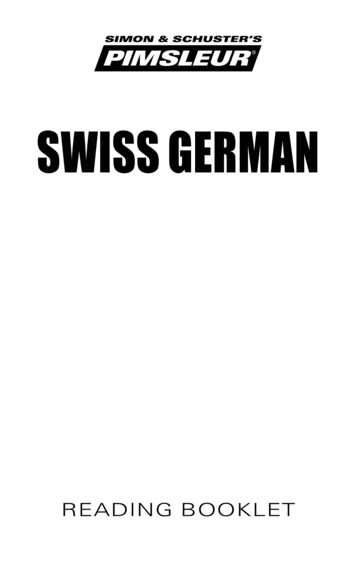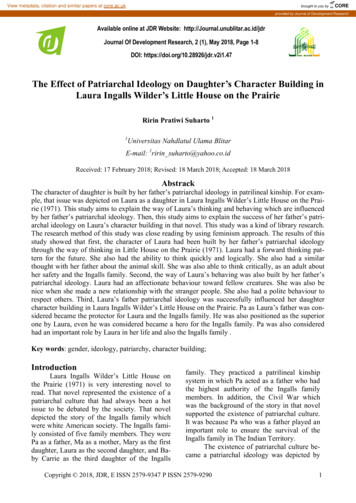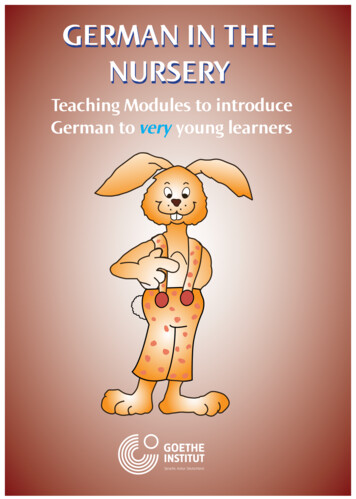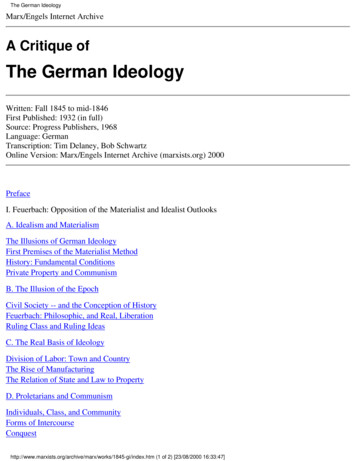
Transcription
The German IdeologyMarx/Engels Internet ArchiveA Critique ofThe German IdeologyWritten: Fall 1845 to mid-1846First Published: 1932 (in full)Source: Progress Publishers, 1968Language: GermanTranscription: Tim Delaney, Bob SchwartzOnline Version: Marx/Engels Internet Archive (marxists.org) 2000PrefaceI. Feuerbach: Opposition of the Materialist and Idealist OutlooksA. Idealism and MaterialismThe Illusions of German IdeologyFirst Premises of the Materialist MethodHistory: Fundamental ConditionsPrivate Property and CommunismB. The Illusion of the EpochCivil Society -- and the Conception of HistoryFeuerbach: Philosophic, and Real, LiberationRuling Class and Ruling IdeasC. The Real Basis of IdeologyDivision of Labor: Town and CountryThe Rise of ManufacturingThe Relation of State and Law to PropertyD. Proletarians and CommunismIndividuals, Class, and CommunityForms of /marx/works/1845-gi/index.htm (1 of 2) [23/08/2000 16:33:47]
The German IdeologyContradictions of Big Industry: RevolutionIII. Saint MaxA. Idealist mistakes & Materialist correctionsIdealist MisconceptionsIndividuality according to MaterialismThe Family, Alienation, Competition, etc.Marx/Engels Works 1845-gi/index.htm (2 of 2) [23/08/2000 16:33:47]
The German IdeologyKarl MarxTHE GERMAN IDEOLOGYPREFACEHitherto men have constantly made up for themselves false conceptions about themselves, about whatthey are and what they ought to be. They have arranged their relationships according to their ideas ofGod, of normal man, etc. The phantoms of their brains have got out of their hands. They, the creators,have bowed down before their creations. Let us liberate them from the chimeras, the ideas, dogmas,imaginary beings under the yoke of which they are pining away. Let us revolt against the rule ofthoughts. Let us teach men, says one, to exchange these imaginations for thoughts which correspond tothe essence of man; says the second, to take up a critical attitude to them; says the third, to knock themout of their heads; and -- existing reality will collapse.These innocent and childlike fancies are the kernel of the modern Young-Hegelian philosophy, which notonly is received by the German public with horror and awe, but is announced by our philosophic heroeswith the solemn consciousness of its cataclysmic dangerousness and criminal ruthlessness. The firstvolume of the present publication has the aim of uncloaking these sheep, who take themselves and aretaken for wolves; of showing how their bleating merely imitates in a philosophic form the conceptions ofthe German middle class; how the boasting of these philosophic commentators only mirrors thewretchedness of the real conditions in Germany. It is its aim to debunk and discredit the philosophicstruggle with the shadows of reality, which appeals to the dreamy and muddled German nation.Once upon a time a valiant fellow had the idea that men were drowned in water only because they werepossessed with the idea of gravity. If they were to knock this notion out of their heads, say by stating it tobe a superstition, a religious concept, they would be sublimely proof against any danger from water. Hiswhole life long he fought against the illusion of gravity, of whose harmful results all statistic brought himnew and manifold evidence. This valiant fellow was the type of the new revolutionary philosophers inGermany.Next SectionTable of Contents for The German IdeologyMarxist Writers 1845-gi/preface.htm [23/08/2000 16:33:48]
The German IdeologyKarl MarxTHE GERMAN IDEOLOGYPart IFEUERBACH.OPPOSTION OF THE MATERIALISTAND IDEALIST OUTLOOKA. IDEALISM AND MATERIALISMThe Illusions of German IdeologyAs we hear from German ideologists, Germany has in the last few years gone through an unparalleledrevolution. The decomposition of the Hegelian philosophy, which began with Strauss, has developed intoa universal ferment into which all the "powers of the past" are swept. In the general chaos mightyempires have arisen only to meet with immediate doom, heroes have emerged momentarily only to behurled back into obscurity by bolder and stronger rivals. It was a revolution beside which the FrenchRevolution was child's play, a world struggle beside which the struggles of the Diadochi [successors ofAlexander the Great] appear insignificant. Principles ousted one another, heroes of the mind overthreweach other with unheard-of rapidity, and in the three years 1842-45 more of the past was swept away inGermany than at other times in three centuries.All this is supposed to have taken place in the realm of pure thought.Certainly it is an interesting event we are dealing with: the putrescence of the absolute spirit. When thelast spark of its life had failed, the various components of this caput mortuum began to decompose,entered into new combinations and formed new substances. The industrialists of philosophy, who tillthen had lived on the exploitation of the absolute spirit, now seized upon the new combinations. Eachwith all possible zeal set about retailing his apportioned share. This naturally gave rise to competition,which, to start with, was carried on in moderately staid bourgeois fashion. Later when the Germanmarket was glutted, and the commodity in spite of all efforts found no response in the world market, thebusiness was spoiled in the usual German manner by fabricated and fictitious production, deterioration inquality, adulteration of the raw materials, falsification of labels, fictitious purchases, bill-jobbing and acredit system devoid of any real basis. The competition turned into a bitter struggle, which is now beingextolled and interpreted to us as a revolution of world significance, the begetter of the most prodigiousresults and achievements.If we wish to rate at its true value this philosophic charlatanry, which awakens even in the breast of thehonest German citizen a glow of national pride, if we wish to bring out clearly the pettiness, the parochialnarrowness of this whole Young-Hegelian movement and in particular the tragicomic contrast betweenthe illusions of these heroes about their achievements and the actual achievements themselves, we mustlook at the whole spectacle from a standpoint beyond the frontiers of /1845-gi/part a.htm (1 of 12) [23/08/2000 16:33:55]
The German IdeologyGerman criticism has, right up to its latest efforts, never quitted the realm of philosophy. Far fromexamining its general philosophic premises, the whole body of its inquiries has actually sprung from thesoil of a definite philosophical system, that of Hegel. Not only in their answers but in their very questionsthere was a mystification. This dependence on Hegel is the reason why not one of these modern criticshas even attempted a comprehensive criticism of the Hegelian system, however much each professes tohave advanced beyond Hegel. Their polemics against Hegel and against one another are confined to this-- each extracts one side of the Hegelian system and turns this against the whole system as well as againstthe sides extracted by the others. To begin with they extracted pure unfalsified Hegelian categories suchas "substance" and "self-consciousness", later they desecrated these categories with more secular namessuch as species "the Unique", "Man", etc.The entire body of German philosophical criticism from Strauss to Stirner is confined to criticism ofreligious conceptions. The critics started from real religion and actual theology. What religiousconsciousness and a religious conception really meant was determined variously as they went along.Their advance consisted in subsuming the allegedly dominant metaphysical, political, juridical, moraland other conceptions under the class of religious or theological conceptions; and similarly inpronouncing political, juridical, moral consciousness as religious or theological, and the political,juridical, moral man -- "man" in the last resort -- as religious. The dominance of religion was taken forgranted. Gradually every dominant relationship was pronounced a religious relationship and transformedinto a cult, a cult of law, a cult of the State, etc. On all sides it was only a question of dogmas and beliefin dogmas. The world was sanctified to an ever-increasing extent till at last our venerable Saint Max wasable to canonise it en bloc and thus dispose of it once for all.The Old Hegelians had comprehended everything as soon as it was reduced to an Hegelian logicalcategory. The Young Hegelians criticised everything by attributing to it religious conceptions or bypronouncing it a theological matter. The Young Hegelians are in agreement with the Old Hegelians intheir belief in the rule of religion, of concepts, of a universal principle in the existing world. Only, theone party attacks this dominion as usurpation. while the other extols it as legitimate.Since the Young Hegelians consider conceptions, thoughts, ideas, in fact all the products ofconsciousness, to which they attribute an independent existence, as the real chains of men (just as the OldHegelians declared them the true bonds of human society) it is evident that the Young Hegelians have tofight only against these illusions of consciousness. Since, according to their fantasy, the relationships ofmen, all their doings, their chains and their limitations are products of their consciousness, the YoungHegelians logically put to men the moral postulate of exchanging their present consciousness for human,critical or egoistic consciousness, and thus of removing their limitations. This demand to changeconsciousness amounts to a demand to interpret reality in another way, i.e. to recognise it by means ofanother interpretation. The Young-Hegelian ideologists, in spite of their allegedly "world-shattering"statements, are the staunchest conservatives. The most recent of them have found the correct expressionfor their activity when they declare they are only fighting against "phrases". They forget, however, that tothese phrases they themselves are only opposing other phrases, and that they are in no way combating thereal existing world when they are merely combating the phrases of this world. The only results which thisphilosophic criticism could achieve were a few (and at that thoroughly one-sided) elucidations ofChristianity from the point of view of religious history; all the rest of their assertions are only furtherembellishments of their claim to have furnished, in these unimportant elucidations, discoveries ofuniversal rks/1845-gi/part a.htm (2 of 12) [23/08/2000 16:33:55]
The German IdeologyIt has not occurred to any one of these philosophers to inquire into the connection of German philosophywith German reality, the relation of their criticism to their own material surroundings.First Premises of Materialist MethodThe premises from which we begin are not arbitrary ones, not dogmas, but real premises from whichabstraction can only be made in the imagination. They are the real individuals, their activity and thematerial conditions under which they live, both those which they find already existing and thoseproduced by their activity. These premises can thus be verified in a purely empirical way.The first premise of all human history is, of course, the existence of living human individuals. Thus thefirst fact to be established is the physical organisation of these individuals and their consequent relationto the rest of nature. Of course, we cannot here go either into the actual physical nature of man, or intothe natural conditions in which man finds himself -- geological, hydrographical, climatic and so on. Thewriting of history must always set out from these natural bases and their modification in the course ofhistory through the action of men.Men can be distinguished from animals by consciousness, by religion or anything else you like. Theythemselves begin to distinguish themselves from animals as soon as they begin to produce their means ofsubsistence, a step which is conditioned by their physical organisation. By producing their means ofsubsistence men are indirectly producing their actual material life.The way in which men produce their means of subsistence depends first of all on the nature of the actualmeans of subsistence they find in existence and have to reproduce. This mode of production must not beconsidered simply as being the production of the physical existence of the individuals. Rather it is adefinite form of activity of these individuals, a definite form of expressing their life, a definite mode oflife on their part. As individuals express their life, so they are. What they are, therefore, coincides withtheir production, both with what they produce and with how they produce. The nature of individuals thusdepends on the material conditions determining their production.This production only makes its appearance with the increase of population. In its turn this presupposesthe intercourse [Verkehr]1 of individuals with one another. The form of this intercourse is againdetermined by production.The relations of different nations among themselves depend upon the extent to which each has developedits productive forces, the division of labour and internal intercourse. This statement is generallyrecognised. But not only the relation of one nation to others, but also the whole internal structure of thenation itself depends on the stage of development reached by its production and its internal and externalintercourse. How far the productive forces of a nation are developed is shown most manifestly by thedegree to which the division of labour has been carried. Each new productive force, insofar as it is notmerely a quantitative extension of productive forces already known (for instance the bringing intocultivation of fresh land), causes a further development of the division of labour.The division of labour inside a nation leads at first to the separation of industrial and commercial fromagricultural labour, and hence to the separation of town and country and to the conflict of their interests.Its further development leads to the separation of commercial from industrial labour. At the same 5-gi/part a.htm (3 of 12) [23/08/2000 16:33:55]
The German Ideologythrough the division of labour inside these various branches there develop various divisions among theindividuals co-operating in definite kinds of labour. The relative position of these individual groups isdetermined by the methods employed in agriculture, industry and commerce (patriarchalism, slavery,estates, classes). These same conditions are to be seen (given a more developed intercourse) in therelations of different nations to one another.The various stages of development in the division of labour are just so many different forms ofownership, i.e. the existing stage in the division of labour determines also the relations of individuals toone another with reference to the material, instrument, and product of labour.The first form of ownership is tribal [Stammeigentum]1 ownership. It corresponds to the undevelopedstage of production, at which a people lives by hunting and fishing, by the rearing of beasts or, in thehighest stage, agriculture. In the latter case it presupposes a great mass of uncultivated stretches of land.The division of labour is at this stage still very elementary and is confined to a further extension of thenatural division of labour existing in the family. The social structure is, therefore, limited to an extensionof the family; patriarchal family chieftains, below them the members of the tribe, finally slaves. Theslavery latent in the family only develops gradually with the increase of population, the growth of wants,and with the extension of external relations, both of war and of barter.The second form is the ancient communal and State ownership which proceeds especially from the unionof several tribes into a city by agreement or by conquest, and which is still accompanied by slavery.Beside communal ownership we already find movable, and later also immovable, private propertydeveloping, but as an abnormal form subordinate to communal ownership. The citizens hold power overtheir labouring slaves only in their community, and on this account alone, therefore, they are bound to theform of communal ownership. It is the communal private property which compels the active citizens toremain in this spontaneously derived form of association over against their slaves. For this reason thewhole structure of society based on this communal ownership, and with it the power of the people,decays in the same measure as, in particular, immovable private property evolves. The division of labouris already more developed. We already find the antagonism of town and country; later the antagonismbetween those states which represent town interests and those which represent country interests, andinside the towns themselves the antagonism between industry and maritime commerce. The class relationbetween citizens and slaves is now completely developed.With the development of private property, we find here for the first time the same conditions which weshall find again, only on a more extensive scale, with modern private property. On the one hand, theconcentration of private property, which began very early in Rome (as the Licinian agrarian law proves 1) and proceeded very rapidly from the time of the civil wars and especially under the Emperors; on theother hand, coupled with this, the transformation of the plebeian small peasantry into a proletariat, which,however, owing to its intermediate position between propertied citizens and slaves, never achieved anindependent development.The third form of ownership is feudal or estate property. If antiquity started out from the town and itslittle territory, the Middle Ages started out from the country. This different starting-point was determinedby the sparseness of the population at that time, which was scattered over a large area and which receivedno large increase from the conquerors. In contrast to Greece and Rome, feudal development at the outset,therefore, extends over a much wider territory, prepared by the Roman conquests and the spread ofagriculture at first associated with it. The last centuries of the declining Roman Empire and its /1845-gi/part a.htm (4 of 12) [23/08/2000 16:33:55]
The German Ideologyby the barbarians destroyed a number of productive forces; agriculture had declined, industry haddecayed for want of a market, trade had died out or been violently suspended, the rural and urbanpopulation had decreased. From these conditions and the mode of organisation of the conquestdetermined by them, feudal property developed under the influence of the Germanic militaryconstitution. Like tribal and communal ownership, it is based again on a community; but the directlyproducing class standing over against it is not, as in the case of the ancient community, the slaves, but theenserfed small peasantry. As soon as feudalism is fully developed, there also arises antagonism to thetowns. The hierarchical structure of land ownership, and the armed bodies of retainers associated with it,gave the nobility power over the serfs. This feudal organisation was, just as much as the ancientcommunal ownership, an association against a subjected producing class; but the form of association andthe relation to the direct producers were different because of the different conditions of production.This feudal system of land ownership had its counterpart in the towns in the shape of corporativeproperty, the feudal organisation of trades. Here property consisted chiefly in the labour of eachindividual person. The necessity for association against the organised robber-nobility, the need forcommunal covered markets in an age when the industrialist was at the same time a merchant, thegrowing competition of the escaped serfs swarming into the rising towns, the feudal structure of thewhole country: these combined to bring about the guilds. The gradually accumulated small capital ofindividual craftsmen and their stable numbers, as against the growing population, evolved the relation ofjourneyman and apprentice, which brought into being in the towns a hierarchy similar to that in thecountry.Thus the chief form of property during the feudal epoch consisted on the one hand of landed propertywith serf labour chained to it, and on the other of the labour of the individual with small capitalcommanding the labour of journeymen. The organisation of both was determined by the restrictedconditions of production -- the small-scale and primitive cultivation of the land, and the craft type ofindustry. There was little division of labour in the heyday of feudalism. Each country bore in itself theantithesis of town and country; the division into estates was certainly strongly marked; but apart from thedifferentiation of princes, nobility, clergy and peasants in the country, and masters, journeymen,apprentices and soon also the rabble of casual labourers in the towns, no division of importance tookplace. In agriculture it was rendered difficult by the strip-system, beside which the cottage industry of thepeasants themselves emerged. In industry there was no division of labour at all in the individual tradesthemselves, and very little between them. The separation of industry and commerce was found already inexistence in older towns; in the newer it only developed later, when the towns entered into mutualrelations.The grouping of larger territories into feudal kingdoms was a necessity for the landed nobility as for thetowns. The organisation of the ruling class, the nobility, had, therefore, everywhere a monarch at itshead.The fact is, therefore, that definite individuals who are productively active in a definite way enter intothese definite social and political relations. Empirical observation must in each separate instance bringout empirically, and without any mystification and speculation, the connection of the social and politicalstructure with production. The social structure and the State are continually evolving out of thelife-process of definite individuals, but of individuals, not as they may appear in their own or otherpeople's imagination, but as they really are; i.e. as they operate, produce materially, and hence as theywork under definite material limits, presuppositions and conditions independent of their 45-gi/part a.htm (5 of 12) [23/08/2000 16:33:55]
The German IdeologyThe production of ideas, of conceptions, of consciousness, is at first directly interwoven with the materialactivity and the material intercourse of men, the language of real life. Conceiving, thinking, the mentalintercourse of men, appear at this stage as the direct efflux of their material behaviour. The same appliesto mental production as expressed in the language of politics, laws, morality, religion, metaphysics, etc.of a people. Men are the producers of their conceptions, ideas, etc. -- real, active men, as they areconditioned by a definite development of their productive forces and of the intercourse corresponding tothese, up to its furthest forms. Consciousness can never be anything else than conscious existence, andthe existence of men is their actual life-process. If in all ideology men and their circumstances appearupside-down as in a camera obscura, this phenomenon arises just as much from their historicallife-process as the inversion of objects on the retina does from their physical life-process.In direct contrast to German philosophy which descends from heaven to earth, here we ascend from earthto heaven. That is to say, we do not set out from what men say, imagine, conceive, nor from men asnarrated, thought of, imagined, conceived, in order to arrive at men in the flesh. We set out from real,active men, and on the basis of their real life-process we demonstrate the development of the ideologicalreflexes and echoes of this life-process. The phantoms formed in the human brain are also, necessarily,sublimates of their material life-process, which is empirically verifiable and bound to material premises.Morality, religion, metaphysics, all the rest of ideology and their corresponding forms of consciousness,thus no longer retain the semblance of independence. They have no history, no development; but men,developing their material production and their material intercourse, alter, along with this their realexistence, their thinking and the products of their thinking. Life is not determined by consciousness, butconsciousness by life. In the first method of approach the starting-point is consciousness taken as theliving individual; in the second method, which conforms to real life, it is the real living individualsthemselves, and consciousness is considered solely as their consciousness.This method of approach is not devoid of premises. It starts out from the real premises and does notabandon them for a moment. Its premises are men, not in any fantastic isolation and rigidity, but in theiractual, empirically perceptible process of development under definite conditions. As soon as this activelife-process is described, history ceases to be a collection of dead facts as it is with the empiricists(themselves still abstract), or an imagined activity of imagined subjects, as with the idealists.Where speculation ends -- in real life -- there real, positive science begins: the representation of thepractical activity, of the practical process of development of men. Empty talk about consciousnessceases, and real knowledge has to take its place. When reality is depicted, philosophy as an independentbranch of knowledge loses its medium of existence. At the best its place can only be taken by asumming-up of the most general results, abstractions which arise from the observation of the historicaldevelopment of men. Viewed apart from real history, these abstractions have in themselves no valuewhatsoever. They can only serve to facilitate the arrangement of historical material, to indicate thesequence of its separate strata. But they by no means afford a recipe or schema, as does philosophy, forneatly trimming the epochs of history. On the contrary, our difficulties begin only when we set about theobservation and the arrangement -- the real depiction -- of our historical material, whether of a past epochor of the present. The removal of these difficulties is governed by premises which it is quite impossibleto state here, but which only the study of the actual life-process and the activity of the individuals of eachepoch will make evident. We shall select here some of these abstractions, which we use incontradistinction to the ideologists, and shall illustrate them by historical s/1845-gi/part a.htm (6 of 12) [23/08/2000 16:33:55]
The German IdeologyHistory: Fundamental ConditionsSince we are dealing with the Germans, who are devoid of premises, we must begin by stating the firstpremise of all human existence and, therefore, of all history, the premise, namely, that men must be in aposition to live in order to be able to "make history". But life involves before everything else eating anddrinking, a habitation, clothing and many other things. The first historical act is thus the production of themeans to satisfy these needs, the production of material life itself. And indeed this is an historical act, afundamental condition of all history, which today, as thousands of years ago, must daily and hourly befulfilled merely in order to sustain human life. Even when the sensuous world is reduced to a minimum,to a stick as with Saint Bruno [Bauer], it presupposes the action of producing the stick. Therefore in anyinterpretation of history one has first of all to observe this fundamental fact in all its significance and allits implications and to accord it its due importance. It is well known that the Germans have never donethis, and they have never, therefore, had an earthly basis for history and consequently never an historian.The French and the English, even if they have conceived the relation of this fact with so-called historyonly in an extremely one-sided fashion, particularly as long as they remained in the toils of politicalideology, have nevertheless made the first attempts to give the writing of history a materialistic basis bybeing the first to write histories of civil society, of commerce and industry.The second point is that the satisfaction of the first need (the action of satisfying, and the instrument ofsatisfaction which has been acquired) leads to new needs; and this production of new needs is the firsthistorical act. Here we recognise immediately the spiritual ancestry of the great historical wisdom of theGermans who, when they run out of positive material and when they can serve up neither theological norpolitical nor literary rubbish, assert that this is not history at all, but the "prehistoric era". They do not,however, enlighten us as to how we proceed from this nonsensical "prehistory" to history proper;although, on the other hand, in their historical speculation they seize upon this "prehistory" with especialeagerness because they imagine themselves safe there from interference on the part of "crude facts", and,at the same time, because there they can give full rein to their speculative impulse and set up and knockdown hypotheses by the thousand.The third circumstance which, from the very outset, enters into historical development, is that men, whodaily remake their own life, begin to make other men, to propagate their kind: the relation between
Online Version: Marx/Engels Internet Archive (marxists.org) 2000 Preface I. Feuerbach: Opposition of the Materialist and Idealist Outlooks A. Idealism and Materialism The Illusions of German Ideology First Premises of the Materialist Method History: Fundamental Conditions Private Property and Communism B. The Illusion of the Epoch



